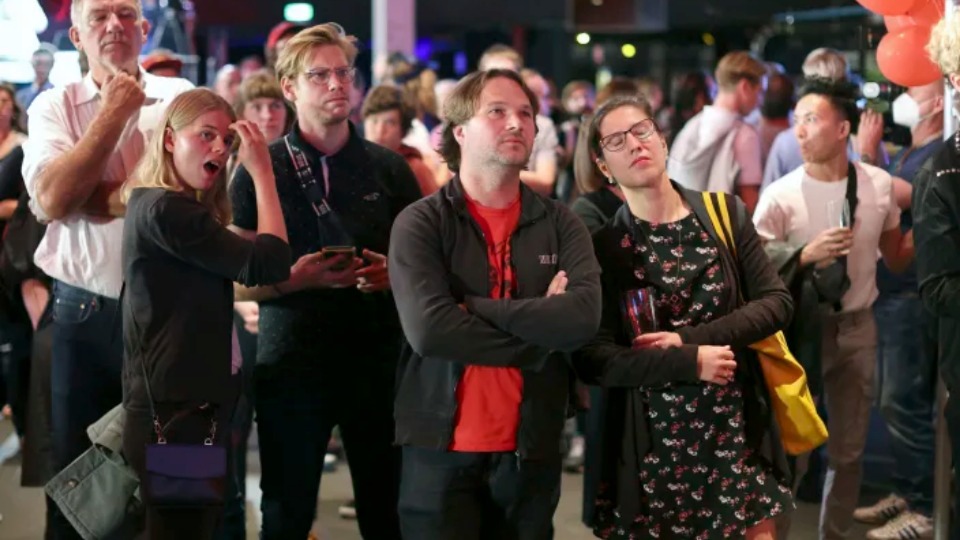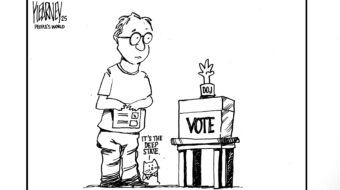
The center-left candidate fighting to succeed Angela Merkel as Germany’s chancellor declared that his Social Democratic Party (SPD) intends to forge a “social-ecological-liberal coalition” after coming in first in Sunday’s election. With 25.7%, the SPD beat the center-right Christian Democratic Union (CDU), currently in power, which garnered 24.1%, its worst showing in the 70-year history of the party.
The Greens received their biggest vote ever, with 14.8% of the vote and the Left Party (Die Linke) came in with 4.9%, meaning that center-left and left parties bested the CDU and its Bavarian Christian Social Union partners by almost a 2-1 margin.

In the new Bundestag, the breakdown for the parties will be 206 for the SPD, 196 for the CDU/CSU, 118 for the Greens, 83 for the ultra-right Alternative for Germany (AfD), and 39 for Die Linke (the Left Party).
“The voters have made themselves very clear,” Olaf Scholz, the SPD leader, said at a press conference Monday morning. He declared that his center-left party, the Greens, and the Free Democratic Party (FDP) had all picked up significant numbers of new votes, while the conservative CDU suffered a loss in support of almost nine percentage points.
“And that’s why we have a visible mandate that the citizens of this country have formulated,” said Scholz, who is vice-chancellor in the outgoing government where his party was the junior party to the CDU in a so-called “Grand Coalition.” The FDP, which Scholz described as “liberal,” is, in fact, however, a largely pro-business party.
The Greens can’t automatically be counted on to hook up with the Social Democrats in a coalition, however. There are some sections of the party that can be characterized as solidly left-wing, but there are also sections on the right that have made alliances with big business in some parts of Germany.
The Greens have already agreed to hold preliminary talks with the FDP. Their vote percentage, 14.8%, combined with the FDP’s 11.5%, puts them slightly ahead of both the SPD and the CDU. When those talks finish, however, they will, of course, have to begin discussions with the other parties to come up with a majority that can rule.

A so-called “traffic light” power-sharing deal, nicknamed such because of the parties’ colors—SPD (red), FDP (yellow), Greens (green)—is just one possibility, however. The latter two parties could theoretically lend their support to a so-called “Jamaica coalition” with the CDU, led by its chancellor candidate, Armin Laschet. The CDU’s party color is black so it would be a black-yellow-green coalition, the colors of the Jamaican flag.
Laschet, the CDU leader, seemed to take a page from Donald Trump’s book when he did not concede on election night and instead announced that he was doing “everything possible” to form and lead a new government. At that time, the vote totals for the CDU and SPD were nearly identical.
But the SPD’s lead increased overnight as more mail-in votes were counted, and it moved almost two points ahead of the CDU. That, plus the fact that the media blasted out the news that the CDU had garnered its lowest vote ever, forced Laschet, still refusing to cede, to be a bit more modest by Monday morning. He ignored, however, the fact that parties constituting the center and the left far outpolled his center-right coalition.
While the result of the vote “cannot, must not, and won’t satisfy the [Christian Democratic] Union,” the CDU leader said at a press conference, it did not yield a government mandate for either of the largest parties.
Huge numbers of German voters, contrary to his claim, turned out to demand change. They expressed anger about government inaction on climate change, for example. Some 200 Germans died in floods recently in the western part of the country, floods widely attributed to climate change.
The Laschet analysis that Germans don’t want change is also being taken up by much of the press here in the U.S—an analysis challenged, however, by many in Germany, including the mainstream media there.
On the mainstream Bild newspaper’s television station, commentator Paul Ronheimer said Laschet was “living in a different reality.” Even several conservative politicians who had backed Laschet were already, by Monday, distancing themselves from him.
“Second place cannot be construed to amount to a mandate to form the next government,” tweeted Markus Söder, the Bavarian state premier whom many conservatives had wanted to see run for the top job in Laschet’s stead. At a press conference, the leader of the CSU, the Bavarian sister party of the CDU, and part of its ruling coalition, called the vote a “disappointing result” and a “defeat that cannot be sugarcoated.”
The extreme-right Alternative for Germany party also lost votes, dropping to 10% from its previous 14%.

The Left Party (Die Linke) lost votes, too, eking out only 4.9%. German election rules require a party to beat a 5% nationwide threshold or win at least three seats outright to secure a place in parliament. By doing the latter, the Left Party was able to take a total of 39 seats in the Bundestag.
In some ways, it was Left Party’s successes that helped reduce its totals. Its biggest losses came in Berlin, ironically, where it had successfully spearheaded a campaign to freeze rents for five years and reportedly won a referendum on Sunday that expropriate thousands of apartments from big German real estate conglomerates like Deutsche Wohnen and turn them into social housing.
In Berlin, the Left Party is part of a ruling red-red-green coalition of the SPD, itself, and the Greens. The SPD, which leads that coalition, campaigned by bragging how it was responsible for winning the freeze, even though it was the Left Party that did most of the work to build public support and win it.
The SPD reaped the reward with big gains in Berlin, while the Left Party lost votes. Early results suggest it was another case of left-wing parties and Communists not getting the credit for their policies and work when they enter coalitions with center forces. If things don’t work out, however, they often get the blame.
Further details and analysis on the German elections and their expected impact around the world will appear in the pages of People’s World in the coming days, including from Victor Grossman, our correspondent in Berlin.










